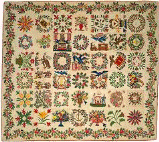Textile Society of America

Textile Society of America: Symposium Proceedings
Date of this Version
9-2012
Document Type
Article
Citation
Published in Textiles and Politics: Textile Society of America 13th Biennial Symposium Proceedings, Washington, DC, September 18- September 22, 2012.
Abstract
Known in America both as the daughter of beloved British Arts and Crafts leader William Morris and as the talented designer and embroiderer of Morris & Company's sensational Fruit Garden portieres, May Morris arrived in New York in October 1909 to begin a five-month lecture tour of the United States. Bombarded by questions from an excited press relating to her work and the Arts and Crafts movement, Morris was caught off-guard by questions on a topic she did not expect: her thoughts on America's burgeoning women's rights movement. As a woman confidently treading new ground in the textile arts, Morris was expected to use her tour as a platform to advocate for both her art and her gender. Though initially hesitant to engage in American politics, May Morris emerged an outspoken advocate for trade unions and guilds for female textile artists. However, she also emerged a bitter enemy of those she felt limited women's rights to fair wages and creative work, including American Arts and Crafts leader Gustav Stickley. This presentation will offer new scholarship about May Morris' American lecture tour and discuss her ideas on the state of female textile artists in the challenging political environment of early twentieth century America. By attending suffrage rallies in New York City, living at Hull House for a month in Chicago, and dazzling women's clubs and handicraft guilds everywhere in between, Morris used her celebrity to build trans-Atlantic camaraderie between women in the arts during this exciting time of activism and awakening.


Comments
Copyright 2012 by the author(s).